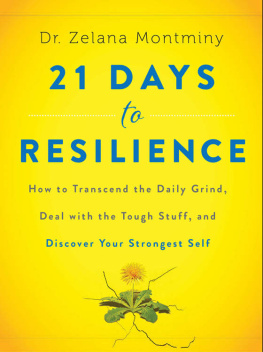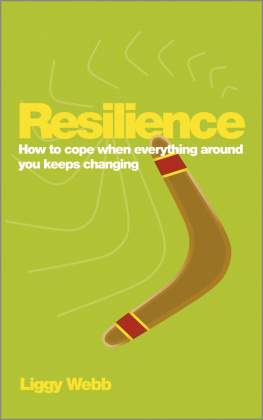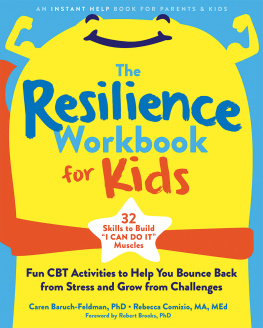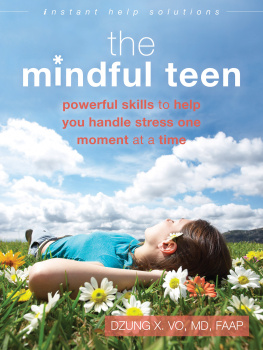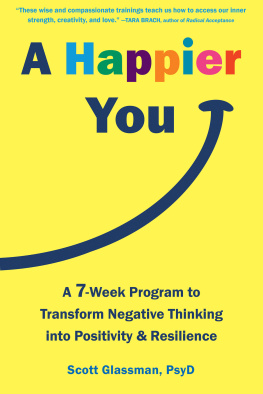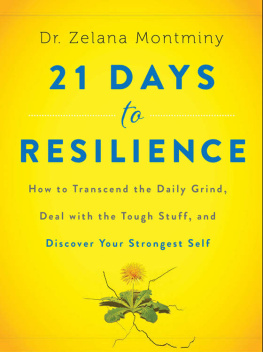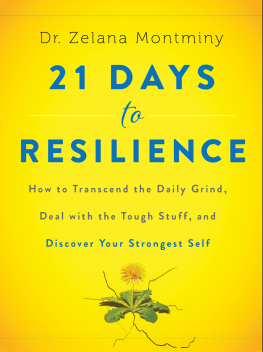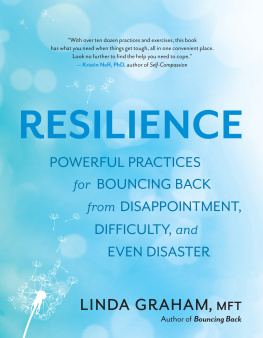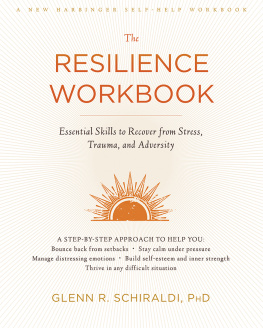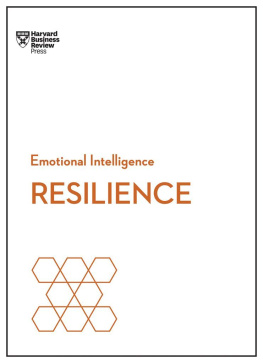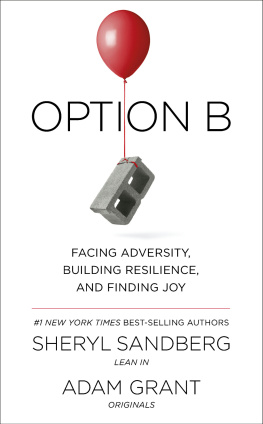
To Joel, Ethan, and Ava
You are my light, my hope, my heart.
Contents
Guide
Given the number of exercises in these pages, I encourage those using an e-reader device (without writing capabilities) to use a separate notebook.

When one door of happiness closes, another opens; but often we look so long at the closed door that we do not see the one which has been opened for us.
HELEN KELLER
A few years ago, a headline in the New York Times caught my attention: What If the Secret to Success Is Failure? The article was about how two principals at very different schoolsone was the head of a charter school with diverse low-income students, and the other, the head of a private school that had mostly affluent studentswere working together to better their students chances for success.
The article quoted the charter schools principal on who he thought would succeed, and it wasnt going to be the kids who got the best grades. It wasnt the happiest ones, the ones who had the strongest social skills, or those who rated highest on intelligence tests. It was the ones who were able to recover from a bad grade and resolve to do better next time; to bounce back from a fight with their parents and work through it better next time; to resist the urge to go out to the movies and stay home and study instead; to persuade professors to give them extra help after classes.
It dawned on me that the students who will succeed are resilient. I started looking more closely at resilience and quickly realized that these students share this vital skill with the strongest, most successful and content people in the world. Happiness isnt the connecting threadbut why?
We do so much of what we think will make us blissful but so many of us are unhappier than ever before. The code to unlocking happiness and success isnt the quest for it after all. Groundbreaking research shows that happiness is in fact much easier to attain if we stop focusing on it so much. Although this might sound counterintuitive, happiness shouldnt be the end goal if you really want to be happy. The antidote: undertake resilience instead.
Our frantic search for happiness is leading us astray primarily because we are fixated on the wrong things. We desperately try to capture good feelings for ourselves, which alienates us from others. As contagious as happiness can be if we express it, the process of attaining it that weve primarily been taught can be a very lonesome pursuit which further decreases happiness. Plus we overestimate how thrilled certain achievements are going to really make us. When we dont feel those emotions we expected, we keep striving for more and more that similarly doesnt produce the feelings we hope for, continuing a vicious cycle. In this way, a focus on happiness mostly serves to highlight our shortcomings. Lasting happiness requires building upon your strengths, persevering, and being gracious with yourself and othersits really not about personal achievements or experiencing fleeting positive thoughts and feelings.
The words happiness and resilience get thrown around often it seems. Because of this, weve tuned out. They have lost their powerful meaning. Overuse doesnt make these concepts any less important though. In fact, they are more important than ever before in our fast-paced world. Ive noticed people these days expect others to solve their problems and often blame society for their issues. In this age of instant gratification and quick results, people seem to get uncomfortable when they have to work hard and problem solve. They reject negative feelings like the plague. But thats not going to make them any happier. In fact, its healthyalmost necessaryto sometimes not be happy in order to find lifelong well-being.
While negative feelings clearly dont feel good, they are important tools for growth and learning. And while our environment definitely affects our lives, it is entirely up to us to have the strength to overcome whatever is thrown at us. That vital muscle, our ability to overcome and learn from our challengesresilienceis often neglected. We need to become more resilient to ultimately be happy. I wrote this book to help you do that.
Were still learning more about the complex trait of resilience every day. Recent research has begun to identify its environmental, neurological, and even possible genetic sources. Although there is much that we still dont know about it, we do know that its not entirely genetic. While some people have an easier time turning trauma into triumphs, resilience is a skill we can all develop. It is not a fixed state of being.
Being resilient does not mean that you wont encounter problems or have difficulties overcoming a challenge in your life. The difference is that resilient people dont let their adversity define them. At its core, resilience is about being capable and strong enough to persevere in adverse or stressful conditionsand to take away positive meaning from that experience.
Living with resilience is more than just bouncing back; it is about shifting our perceptions, changing our responses, and experiencing real growth. Louis Zamperini, whom I had the pleasure of meeting and having dinner with, is one of the greatest examples of this. His story of endurance and survival was well documented in the bestselling book and movie Unbroken. An Olympic runner, Louie fought in World War II, during which he survived a horrific plane crash and seven weeks at sea adrift in the Pacific on a flimsy raft, only to be taken prisoner and forced to endure horrendous conditions in Japanese POW camps. Through it all, he maintained his courage and hope. When I met him a few years ago before he died, he had this twinkle in his eye, and his ever-present zest for life was palpableLouis is the epitome of resilience. He taught me that through our human frailties and due to factors entirely out of our control, we must accept and deal in real time with our flawed existence and our circumstances as they are, not as what we want them to be. The only thing we have control over is that we have the ability to definitively and consciously change how we respond to what life throws at us at any given moment. We all endure challenges, big and small, which are meaningful opportunities for learning and building strength.
One of the most remarkable studies on resilience was published in 2003. In late August 2001, researchers recruited college students for a study measuring resilience and other psychological traits. But then 9/11 unexpectedly and tragically happened, and so, nine days after the attacks, researchers reconnected with participants for a follow-up study on reactions to the attacks. Because the participants level of resilience was measured before and after the attacks, researchers had a unique opportunity to study how they coped. Participants who had scored high on resilience prior to the attacks reported greater positive emotions such as gratitude, interest, and love, even while simultaneously feeling negative emotions such as fear, anger, and sadness. Researchers also found that these highly resilient people actually increased their levels of optimism, well-being, and feelings of tranquillity and peace after 9/11. This study illustrates how highly resilient people seem to not only bounce back from hard times, but also grow and become stronger as a resultthey experience posttraumatic growth. They found a way for their struggle to redefine their life and fill it with new meaning. This type of growth is the cornerstone of resilience.
Next page
